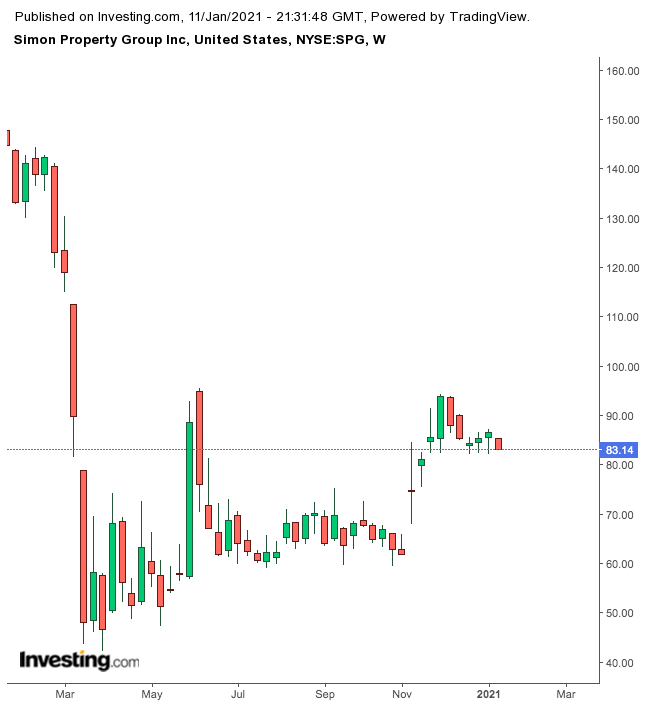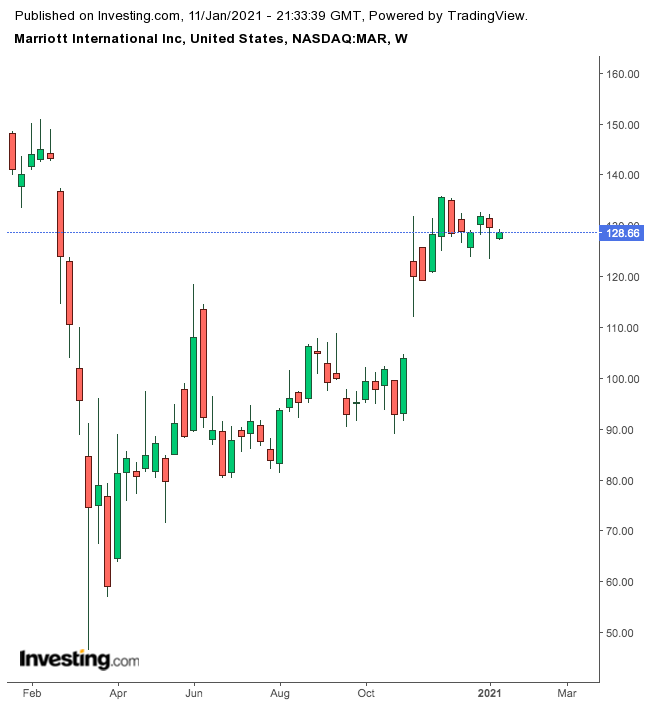Investing in real-estate stocks has been quite challenging since the outbreak of the COVID-19 pandemic last March. While commercial real-estate teetered on the brink of collapse, home prices surged to record highs in the U.S. as people in lockdown looked for bigger homes and a suburban lifestyle.
That contrast sent the shares of hotels, retail and office landlords tumbling, while home builders and companies managing home rentals soared. But that equation has changed during the past quarter as investors, with their eyes on the post-COVID economic recovery, began to snap up the beaten down stocks of mall operators and global hotel chains.
The shares of Simon Property Group (NYSE:SPG), America's largest mall operator, surged more than 40% since the approval of emergency-use vaccines in the U.S. Similarly, Marriott International (NASDAQ:MAR) has surged more than 30% during the past three months.

Though the shares of these companies are still down more than 10% compared with their pre-pandemic levels, their fast recovery suggests that some investors believe the worst is over for these sectors as the rapid rollout of vaccines will unlock a huge, pent up demand for shopping and travel.

A Long Road Ahead
Despite this strong short-term rebound, we don’t see these two real estate categories as out of the woods yet. Some hotel executives have warned that their businesses may not see a full recovery until at least 2023, even if the pandemic comes under control. Some business executives, including Microsoft (NASDAQ:MSFT) co-founder Bill Gates, have suggested business travel won’t bounce back to what it was, maybe ever.
“We still have a long road ahead, but this crisis will come to an end, and I believe travel will rebound quickly,” Marriott CEO Arne Sorenson told investors in November. But, he added that the timing of a full recovery remains “unpredictable.”
For the biggest mall operators in the U.S., the future doesn’t look as rosy as the recovery in their share prices suggest. According to a recent report by Bloomberg, about $52 billion remains unpaid in retail rents since April.
“You’re going to have big bubbles that are going to be hitting next year or even in the fourth quarter,” said Andy Graiser, co-president of advisory firm A&G Real Estate Partners. “I’m not sure if they are going to be able to make those payments in addition to their existing rent.”
Deferred rent was the key factor, pushing CBL & Associates Properties (OTC:CBLEQ) and Pennsylvania RE Investment Trust (NYSE:PEI) into bankruptcy in November. Mall giant Simon, however, seems to be in a better position as it collected 85% of rents in the third quarter, up from about 72% in the previous quarter. Brookfield Property Partners (NASDAQ:BPY) said it collected about 75% of rent due from mall tenants during that same period.
Bottom Line
The mixed picture from this risky segment of the real estate market shows that betting big on commercial real-estate isn’t a good idea, especially when coronavirus cases across the U.S. are surging, new variants of the virus are popping up and the vaccine rollout remains challenging for health authorities.
